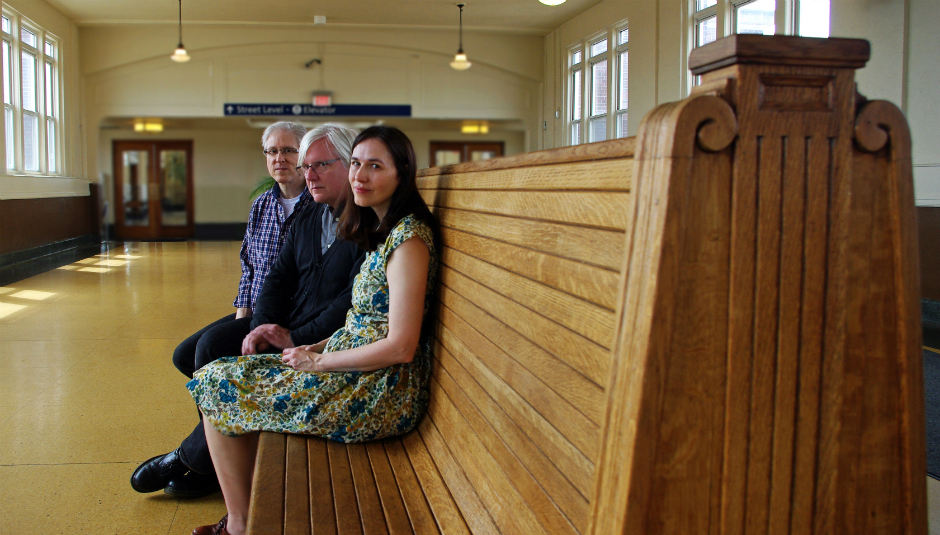Looking out from your window long enough, remnants of a former paradise are still visible. Even in bustling, polluted squares or sleek parking lots, you are bound to find a pluck of green weeds peering somewhere through the seams. While humankind restlessly destroys and rebuilds, nature stubbornly continues to grow and reach for the light. For the bulk of their three-decade career, Lancaster’s very own The Innocence Mission have been similarly wholesome in their craft. The group’s placid, disarmingly pretty folk seems like a rare entity stuck in amber, unspoilt by the outside world’s increasingly ugly predicament.
Naturally, when I first heard The Innocence Mission about four years ago, I thought they were a relatively new band. On the song in question, the piano-based ‘Washington Field Trip’, multi-instrumentalist Karen Peris confesses in her signature wistful, feathery lilt: “I don't feel comfortable standing / In front of this many people, or speaking / But I see we're all the same now”. It struck a nerve. Even though the word ‘mission’ was embedded in this band’s name, I never got the impression this kind, benevolent voice attempted to get through to me with force.
The Innocence Mission have a rustic, sentimental grace about them, like an object you always carry along because it holds cherished personal memories and feelings. Though their music is rooted in deep Christian faith, their vocabulary opts for transparency, lightness and simple gestures over weighty religious dogma. There is a puritan quality to their more recent records, an implied naiveté usually associated with bands just starting to venture out into the open. It’s easy to peg The Innocence Mission as a bunch of quaint, ingenuous escapists whose fragile makeup could shatter with the slightest disturbance. Like the weeds, plants, and trees engulfing a cityscape if left unchecked, their music’s unmitigated beauty is underpinned by a palpable resilience, one that travels way back to their absolute beginnings.
At the tender age of sixteen, Karen already met her one true love, Don Peris, in high school during the production of the musical Godspell. Their first show as The Innocence Mission, with friends Mike Bitts (bass) and Steve Brown (drums), was allegedly at a prom night, though both Don and Karen’s memory are somewhat fuzzy on those exact details. “I mostly remember really liking Karen,” Don ruminates “I was mostly just interested in her. But that also included the music she enjoyed.”
Though Don Peris’s golden John Denver locks have been faded to a silvery white, his often affably clumsy answers still echo a shy, gullible teenager. He confesses this interview marks the band’s first Skype call ever, and his fumbling of the laptop camera to begin this interview is immediately winsome. For most of the interview, his face is out of view. At one point he calls me Jason by accident instead of Jasper; funnily enough, Jason was what my parents initially planned on calling me. And later in the interview, when I address ‘Star Of Land And Sea’ – the one song he sings on latest LP Sun On The Square – he politely points out I actually misheard the word ‘cars’ for ‘curse’ in the lyrics. Though I considered us even there, Don still goes out of his way to pin it on his “bad pronunciation”.
It’s the kind of wide-eyed, sincere sweetness that you can’t help but swoon over. And that sweetness spirals even more into aww-territory as Karen tells him – in a reserved hushed tone – he actually did help her discover music, recollecting the time he once gave her Rumours by Fleetwood Mac. “That’s a pretty good one: it could have been worse. That makes me seem like a pretty okay teenager!” Don jokes.
Even after decades, Don and Karen Peris are not the savviest of interviewees. But there’s grace in their halting quest for thoughtful answers; it’s as if they subconsciously already realize it’s folly to use words to adequately express the profound clarity of their work. They might be too polite to admit it. What’s even more remarkable, perhaps, is how The Innocence Mission manage to preserve their, well, innocence after all this time. After more than three decades – even with a limited scope of their early years as a band – I never got the sense the band were outwardly ambitious to get signed by a major label like A&M Records.
Indeed, for a band with such a specific sonic imprint, it’s fascinating how The Innocence Mission gained global notoriety in almost storybook fashion. They incidentally found an early champion in none other than Joni Mitchell, which led to them recording their self-titled debut LP with Mitchell’s then-husband Larry Klein. Whether or not bands pan out commercially – The Innocence Mission eventually didn’t – most can feed their entire careers off a likewise brush with fame. But as the group’s creative core, Karen and Don seem to have taken it all in stride. There was no hubris about ‘making it’; instead, an understated principle of just writing and playing music as a means of “connecting with people”, as Karen aptly puts it, perseveres.
Truthfully, though, in the mid-eighties era of synth-based new wave splendour and MTV, rustic folk-rock wasn’t exactly a fad. So it’s plausible this played right into The Innocence Mission’s own modest ideals as recording artists, carving out their niche. “That’s very true, it all happened very unexpectedly,” Don nods. “With major labels, it seemed like a different era of music. And yes, forming a band and playing together was just a natural extension of our friendship and friendships with other people. It was something to do: we were trying to figure out what to do post-high school. We never had expectations to be something. We’ve always been grateful for the opportunity to make records and talk to people. Even now still.”
Karen: “We hadn’t really travelled much outside of our own hometown prior to recording for the first time in Los Angeles. So that was a big adventure. Also, to tour around the country for the first time and just meeting people, it was just so nice to talk with people and be with people. Even though I was always pretty nervous to do the performances themselves. But talking with people afterwards, I really liked that.”
After the Klein-produced 1991 follow-up Umbrella and third LP Glow, The Innocence Mission 1999’s Birds Of My Neighborhood marked the start of their current path. As Steve Brown left the band to chase his culinary aspirations, the trio of Mike Bitts and the Perises opted for a now patented, distinctly breathtaking sound, with a more grounded recording ethos to boot. “It’s helpful to be able to record on our own, to work at home,” Karen explains. “And to be able to take our time. I do feel the albums that have come since Birds Of My Neighborhood, our fourth album, were stylistically speaking a new beginning for us. The albums from that point on have felt more personal, truer. We’ve been grateful to be able to work at our own pace.” The converging of delicate homespun recordings and Karen’s vivid lyricism evokes a placid scenery, with recurring imagery of birds, trees and landscapes.
Though two decades in, it might start to feel formulaic, but that’s a huge misconception. The Innocence Mission do eschew complacency, and embracing beauty and wonder isn’t congruent to sticking your head in the sand from deep sadness and universal concern. In fact, releasing an album usually coincides with a period of radical change for Karen, Don and their next of kin. Birds… channeled yearnings of parenthood, and its successor, 2003’s Befriended documents feelings of grief after Karen lost her mother. Long story short: the Innocence Mission’s apparent lack of sonic or tonal progression is actually a testament to resilience and resolve, a beacon to alleviate all the surrounding troubles.
Sun On The Square, their first release on Bella Union, also arrives at a pivotal moment, as the children of the Peris household are now coming of age. “With the children getting older, our roles as parents change,” Karen tells us. “There’s a looming thought that they will go to their own lives. So there’s that kind of possibility and promise for them, and I think this album talks a lot about that change. I’m not so sure that reflects the modern world so much, as much as the changes that remain universal to each person. Because this is something other people are experiencing all the time. There’s a motivation to express that too, to know that other people are going through it as well. To record it, and to express it… that’s what connects us to other people.”
Don: “There’s an awareness that the kids are not going to be around forever. So we’re holding on to these times and enjoy them. It’s nice to have a record coming out in the middle of these times. And as Karen just said, some of these changes have been swelling for the past couple of years, and those have been good sources of inspiration.” The notion of letting things flourish naturally is evoked wonderfully in tracks like ‘The Idea Of Canoeing’, ‘Green Bus’ and ‘Buildings In Flower’. Over the years, their kids, now teenagers, have studied the violin and viola respectively, and their majestic string swells are heard across the record, in the way keeping them close to their elders as they prosper for new challenges in life.
The tears and fears, but also feeling proud, it all permeates through Sun On The Square. The Innocence Mission have figured out how to do the same, without compromising their basic ideals. Decades ago, Joni Mitchell solemnly deplored big paradises being cemented over, finding a level of fame she never asked for. Coincidentally, because of that fame, her endorsement of a group of teenagers – still brimming with altruism and wonder – caused a ripple effect for them. A couple of decades later, another folk icon, Sufjan Stevens praised that very same group, passing on the same lofty lament of nature praising the divine by simply existing and flourishing. Like trees, weeds, and plants, The Innocence Mission still haven’t been swayed by civilization’s imperious structures; they have grown to coexist and grow with them.
Don: “We don’t live in the heart of the city, but not that far out either. It’s sort of a residential neighbourhood. It’s kind of old, it’s been around for a bit. Lots of concrete and asphalt mixed with these beautiful trees and grass. That’s a cool mixture, it’s interesting that those two things can coexist.”
“The natural world can often be a visual expression of what we’re feeling,” Karen adds. “But we can maybe take notice of the mysteries in the actual world more often. Even with trees, there’s a simple love of trees – their physical beauty and their relation to our memory. That’s just how they represent outward expressions of what might be, like outstretched arms. Maybe for those reasons, the natural world is illustrated in a lot of our songs; the way nature expresses itself, that’s the way we aspire to do so as well.”
Spending your days doing what comes naturally to you might be the next best thing. “We probably wouldn’t be making music if Karen hadn’t continued her creative output throughout the years,” Don reflects, his face still half obscured by awkward camera placement. But his words ring true: “We probably would’ve been consumed by the daily task of doing other things. I first credit her for being a mom, it is the best thing she’s ever done. But secondly, continuing to pursue our creative work has allowed us to keep going. We will always be grateful for both those sides.”
Sun On The Square is out now via Bella Union and can be ordered here. For more information about The Innocence Mission, please visit their official website.






















